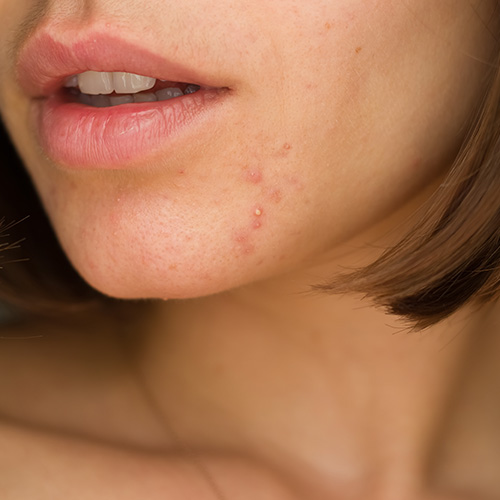Our hormones are key players in our bodies at relaying messages and signals to keep everything functioning properly – though sometimes too much or too little of specific hormones can wreak havoc in our skin. Hormonal Acne, also called adult acne, can affect both men and women but is most common in certain phases of the menstrual cycle, pregnancy, and menopause.
Regular hormone fluctuations can reflect in our skin as increased sensitivity and inflammation, a disrupted skin barrier, and increased sebaceous (oil) gland activity, which can result in acne. If suffering from Hormonal Acne, the goal is to control the skin’s sebum production, maintain the skin’s barrier, and prevent bacteria from getting into the pores and causing acne. It’s also beneficial to determine the cause of the Hormonal Acne to better understand how to treat it. Our team of SKIN experts will be happy to help you come up with a plan to combat this stubborn issue.

+ Complimentary Skin Consultation
+ Glo Peel
+ Custom Pro Peel
+ Jessner Peel
+ Laser Acne Treatment
+ PRP Facial
+ Hormonal Acne treatment with Medication (referral required)
Hormonal Acne is most commonly found on the lower face (lower cheeks, jawline, chin) and on the back. It can range from whiteheads/blackheads to cystic acne.
The main hormones at play are mainly androgens (testosterone), and also estrogen, and progesterone.
Hormonal Acne can be difficult to treat, but finding the root cause will likely improve the inflammation in the skin, along with a tailored skincare routine to keep excess sebum production at bay.
Everyone has different triggers, but many patients state that making certain lifestyle choices helped the state of their skin; These include getting enough sleep (7-8 hours), avoiding excess sugar in their diets, avoiding alcohol, and trying to keep stress levels low.
PRODUCT RECOMMENDATIONS
November 24 – December 1st
Save up to 25% OFF SKIN gift cards and use them on your favourites all year long.
Your privacy settings
Manage Consent Preferences
Necessary
Analytics
Embedded Videos
Marketing
Facebook Advanced Matching
Facebook CAPI